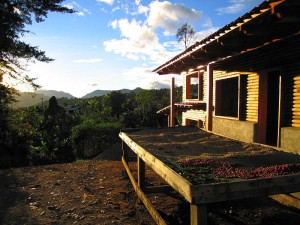Sustainability41
-

Rain, Rain, Go Away…
Assessing biodiversity on coffee farms in Costa Rica is a difficult task when unyielding torrential downpours strike.
-

Achieving Water Sustainability in Ceará, Brazil
Achieving sustainable water sustainability in Brazil’s semi-arid northeast will involve more than just building pipes, pumps and water towers: it will require significant changes in the ways water is monitored, distributed and used throughout the region.
-

How Coffee Affects Biodiversity
S. Amanda Caudill is currently evaluating mammal biodiversity in coffee dominated regions in Turrialba, Costa Rica. Her findings will help determine which habitat parameters are important to the mammals and shape suggestions on how to enhance the habitat.
-

Vertical Farms: From Vision to Reality
Dr. Dickson Despommier believes vertical farming—the growing of crops indoors in multi-story urban buildings—can help feed the growing global population and undo the environmental damage caused by conventional agriculture.
-

Join a Conversation About 7 Billion People
The world’s population will reach 7 billion this year, and the UN estimates continued growth, primarily in less-developed regions. What will this steep population growth mean for our environmental, economic and social systems? Join the conversation on Oct. 17.
-

Wasteland Transformed into Magnificent Freshkills Park
Odors of putrid garbage and mismanaged waste are being replaced by fragrant grass and flowers at Staten Island’s Freshkills Park, once the world’s biggest landfill.
-

Your Nose Knows Evolution – Do You?
Olfaction is one of the least understood senses but has played a vital role in the evolution of vertebrates. Basic survival behaviors such as foraging, communicating, recalling memory, and reproduction are often dependent on a protruding-facial structure that we too often ignore.
-

Summer Ecosystem Experiences for Undergraduates
CERC is now accepting applications for the Summer Ecosystem Experiences for Undergraduates.
-

Conservation of Biodiversity in Orquídeas National Park
Researchers from The New York Botanical Garden are working to document the plant life in Las Orquídeas National Park, one of the last remaining prized and unexplored rainforests that borders Columbia’s Pacific coast.

By studying thousands of buildings and analyzing their electricity use, Columbia Climate School Dean Alexis Abramson has been able to uncover ways to significantly cut energy consumption and emissions. Watch the Video: “Engineering a Cooler Future Through Smarter Buildings“
